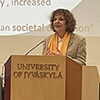The next seminar in the series Department of Philosophy Research Seminars will be held on Wednesday 13 March between 17:30 and 19:00, in Room 116, Old Humanities Building, University of Malta Msida Campus.
Professor Audrius Beinorius, Institute of Asian and Transcultural Studies, Vilnius University will talk about (Post)colonial Imagination in Buddhist Philosophy Studies.
Buddhism has profoundly touched the Western imagination in a surprisingly widespread way and has done so for hundreds of years, evoking a sustained fascination. However, it was not until late 19th century that 'Buddhist philosophy' was recognised as an independent subject for scholarly inquiry. My intention is to turn to a discussion of those peculiar forms in which the knowledge of Buddhist philosophy was presented, emphasising those initial imaginative constructions and early discourses that shaped the birth of the scholarly discipline. Perhaps the most significant feature in the Western construction of ‘Buddhism’ was the tendency for orientalists to locate the reified object of their discourses firmly within a clearly defined body of classical texts. Ideas on what Buddhism is and is not are very much the product of the contingent historical circumstances and evolution of the modern tradition of interpretation. This seminar will explore how in each generation, the new problematics of Western philosophy has yielded correspondingly new, but not necessarily more 'correct', readings of the Buddhist tradition. Supposedly, the main function of Buddhist philosophy studies and of the Asian studies in general becomes that of helping the West define its own self-image.
Audrius Beinorius is a Professor of Indian and Buddhist studies at Vilnius University, Lithuania. Between 2004 and 2014 he was the director of the Oriental Studies Center. He has been working and doing research in the UK, India, Thailand, the Netherlands, the USA (as Fulbright Fellow at Brown University), as well as at the universities of Paris Sorbonne (France), Nanzan (Japan), Heidelberg (Germany), and Tartu (Estonia). His fields of academic interest include the problem of consciousness in classical and contemporary Indian philosophy, Indian Buddhism, South Asian cosmology, Cultural psychology, Reception of Indian Philosophy in the West, Postcolonial studies. He has published three books and over 80 academic papers, and translations from Sanskrit and Pali languages.


